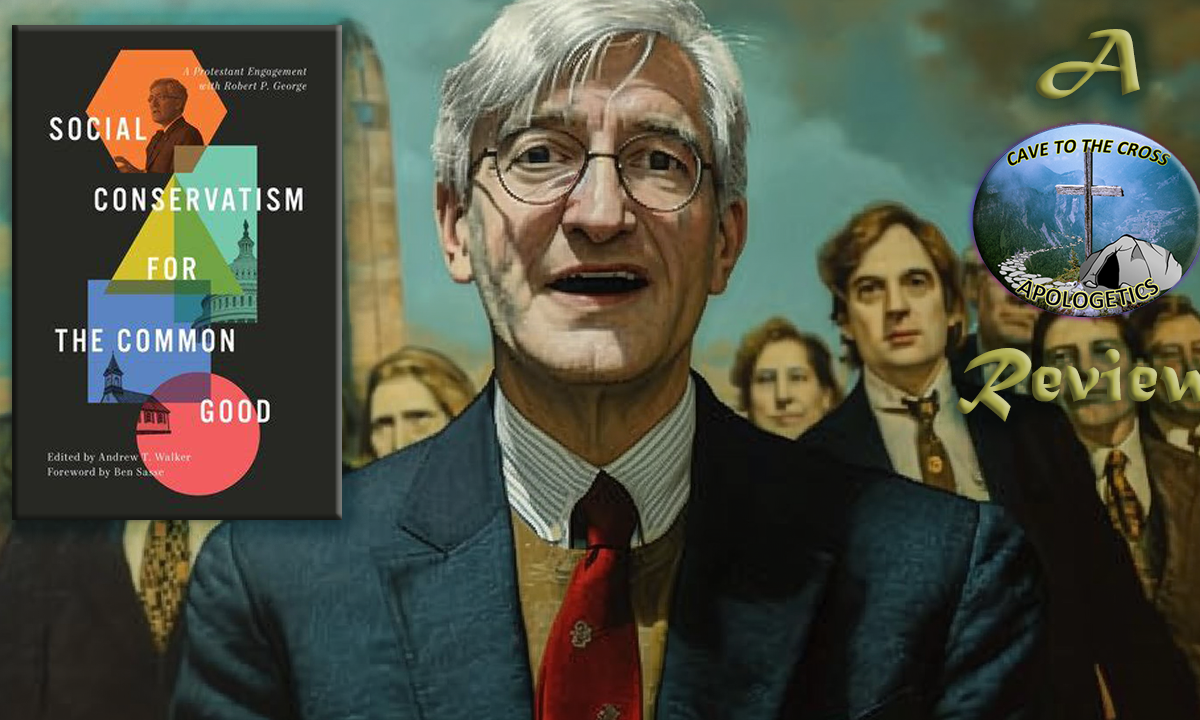Podcast: Play in new window | Download
Social Conservatism For The Common Good: A Protestant Engagement With Robert P. George By Andrew T. Walker
Synopsis:
Andrew Walker does his darndest to convince the reader of the importance of social conservative Robert P. George who found his biggest influence before the start of the 21st century. Even though George is a Roman Catholic, Walker heralds George’s work and argumentation to the Protestants of American looking for some philosophical grounding to their conservatism.
Video
Review
It should be made clear that this review is about the book that covers Robert P. George and is not a critique of George and his philosophy. Some overlapping is unavoidable but this is a book review and not necessarily a philosophy review.
What Andrew Walker does here is introduce Robert P. George to an audience that probably hasn’t heard about or remembers George from the early 1990s when he was more at the forefront of conservative thought. The audience Walker is directing his book – and what the authors of the individual chapters are writing to – is to the conservative Christian evangelical. This point is made over and over – and to a fault. While it’s clear the author(s) are passionate about their friend and intellectual leader there is an over-emphasis of the audience. Since George is a Roman Catholic, the author(s) try to find common ground for the audience to accept the ideas coming from George who is making them from a non-religious point of view or from a religious view that Catholics and Protestants would likely agree on. This goes from at times, not being needed to emphasize to at worst trying to sell a used car to someone just browsing on a lazy Sunday. The evangelical who is reading this philosophy-heavy (for the layperson) book is going to care more about the ideas rather than the ideas coming from a Roman Catholic or it’s the reader who isn’t going to be swayed that they are coming from a Roman Catholic and won’t be reading it. This book is an over-emphasis evangelical tool to evangelicals on a non-evangelical.
I won’t go through each chapter but the range is quality is all over the place depending on the author. There are chapters where the focus is on one of George’s books and the philosophy is mixed throughout the discussion on the book and the impact. These should have been separated for clarity purposes. The chapter talking about George’s use of natural law was very muddled and definitions of terms weren’t highlighted as needed. It reminded me of the issues people have with Clearance Thomas during his confirmation due to his belief and use of natural law philosophy. It’s a virtue signal phrase thrown out to alert people that the person is not to be trusted because they’re a thinking conservative trying to sneak a limitation of power into the Constitution – supposedly a document to limit power.
The chapter on George’s work on abortion and providing the anti-abortion movement in the 1990s with some secular ways of bringing the negative aspects of abortion into view was well written. A discussion on the left’s attempt to split “human being” and “personhood” was fine but could have used some polishing. The author(s), in their affection for George and the anti-abortion movement, however, don’t go on to discuss the limited impact of the philosophy until much recently and used better by “abortion is murder” Refromed/evangelicals.
There are definitely missed opportunities for discussions of worldview and how one would discuss with secular humanist areas that are clearly theistic presuppositions. Human values, worth, and objective truths were once taken for granted in the 1990s and previously are areas of disagreement now. A big letdown is the discussion of George’s view of the role of government and the conflicts that raised in a push for democracy. There is a chapter that attempts to talk about limiting the “giving to Caesar’s what is Caesar’s only” but that one is just as muddled. Having a government that looks to promote that which is good and limiting that which is bad needed more work and while it could make good fodder for a counterpoint-type book, some discussion on the limits of George’s alleged libertarian/classical liberal views (which are only espoused until the final chapters). A philosophical book needs to look at these types of contradictions and since George is human it would be just fine to talk about how they are conflicts or further discussion would be needed.
If you’re looking to read about a classical conservative from the second half of the 20th century this is probably a good book to pick up. However, the muddled and, at times, unfocused writing is a hindrance. On top of that, the constant need to pat the hand of evangelicals and let them know that it’s ok to agree with a Roman Catholic on thoughts that someone who is a Roman Catholic has provided the same feeling as listening to Navi the fairy in Ocarina of Time constantly saying “Hey! Hey! Listen!” over and over.
Final Grade
C-

Get The Book (And Support The Show)
Cave To The Cross GoodReads Page
 To check out more reviews and see what Patrick’s reading go to his GoodReads page here.
To check out more reviews and see what Patrick’s reading go to his GoodReads page here.
Other book reviews can be found here.









